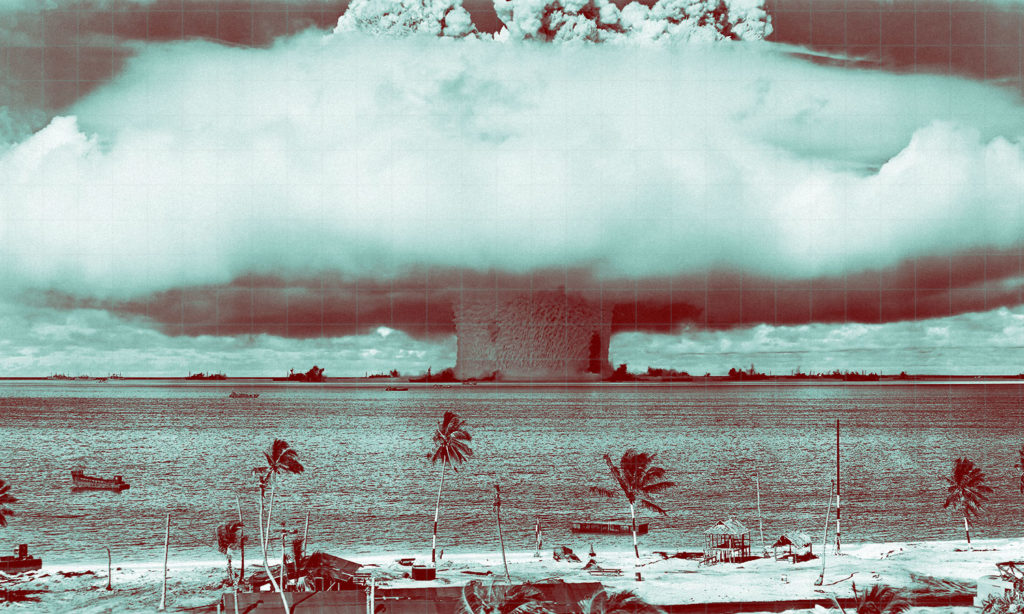They say that all is fair in love and war, but there are some lines that absolutely shouldn’t be crossed in both. These include infidelity and the use of nuclear weapons. We’re all pretty much agreed on those, we even have high-level international treaties to prevent them — nuclear weapons, that is, not cheating, although we wouldn’t be opposed to the former.
As the war in Ukraine enters its eight-month mark, questions are becoming even more pressing over the possibility that Vladimir Putin will use nuclear weapons.
The Russian leader has been overseeing training exercises for the country’s strategic nuclear forces as tensions with the West grow.
President Biden has upped his warnings to Russia, saying that it would be an “incredibly serious mistake” for the country to use a nuclear weapon as allied states grow increasingly concerned that the country is planning to deploy one.
The heightened tension comes after specialist troops trained to deploy nuclear weapons were seen to be mobilised in Russia and Putin himself doubled down on previous threats to use nuclear weapons, saying that he is “not bluffing.”
There have even been claims from a Russian political scientist that the 70-year-old leader is close to the end of his life and wants to “take the world with him.”
Using nuclear weapons would be a vast escalation of the fighting in Ukraine and would inevitably demand an aggressive international response. It’s basically the worst of all possible outcomes, although the West would be keen to avoid it devolving into a nuclear-back-and-fourth that could, you know, wipe out all life on Earth.
Here’s what you need to know.
How Likely Is It That Russia Will Use Nuclear Weapons?
“He is bluffing right now,” Yuri Fyodorov, a military analyst based in Prague, told Reuters. “But what will happen in a week or a month from now is difficult to say — when he understands the war is lost.”
The chances that Russia would use a nuclear weapon have always been lurking in the background but in recent weeks they have increased.
A letter was sent to the UN this week from Russia detailing claims that Ukraine could be planning to use a “dirty bomb” — an improvised nuclear device — against the country. Russia has circulated a 310-page document amongst its security council claiming that Ukraine is working on weapons of mass destruction that could be used in the war effort. They state that a “false flag’ attack could be launched whereby Ukraine blames Russia for a nuclear attack that they launched, giving the West an excuse to launch a full-scale retaliation.
The Russians are understandably touchy about the claims, which have reportedly been debunked, and eager to turn the tide of the war that they appear to be losing. This is where things get dangerous.
One conceivable path to nuclear launch could come from the fact that Russia officially annexed parts of occupied Ukraine at the start of the month, claiming 18% of the country nearest the Russian border as its own. That matters because Russian official military doctrine states that a nuclear strike is permitted only after “aggression against the Russian Federation with conventional weapons when the very existence of the state is threatened”.
Because Putin now considers parts of Ukraine to make up the “Russian Federation,” it’s possible that a Ukrainian advance on those territories could be construed as an attack on Russia and therefore a justification for a nuclear attack.
The CIA director William Burns has said that “we have to take very seriously these kinds of threats given everything that’s at stake.”
However, he also stated that America has no “practical evidence” that Putin is mobilising to use nuclear weapons in the immediate future.
A senior US defence official has also confirmed in recent days that Russia has not made any decision to launch a nuclear attack and that communication lines are open between the country and the US.
This being said, Valery Solovey, a former professor of political science at Moscow’s Institute of International Relations, has claimed that the decision to use nuclear weapons has “already been made.”
Speaking to The Mirror, Solovey claims that Putin’s ill health is affecting his decision-making and that he cannot allow himself to lose the war in Ukraine.
“The president is not able to adequately assess the situation and make proper decisions.”
“He has two tools left in his sleeve: mobilisation, which he is using [and] nuclear weapons.”
Solovey, who has been consulted by Western embassies in Moscow, claims that the world is now closer to “nuclear apocalypse” than it was during the Cuban Missile Crisis.
What Kind of Impact Would They Have?
Russia has control of the world’s largest stock of nuclear weapons, 5,977 to be exact. Around 1,500 of these are thought to be retired weapons due for dismantling. The rest are mainly strategic nukes that are designed to be fired over long distances. The rest are what’s known as “tactical nuclear weapons.”
The latter category is the type that would most likely be used in the event of a Russian attack. They are small nuclear warheads designed for use on the battlefield or for limited impact without causing nuclear fallout.
The smallest tactical nuclear weapons are one kiloton – the equivalent of a thousand tonnes of TNT — while the biggest can be up to 1000. For context, the only nuclear weapons ever used in combat were those dropped by the Americans on Hiroshima and Nagasaki in 1945. The bomb that flattened the former city was 15 kilotons.
NATO has previously said it might consider nuclear fallout that blows into a NATO country to constitute an attack on its members — something that would demand a response.
It’s thought that a tactical nuclear weapon isn’t really that useful in combat as it achieves only what can be done with lots of other bombs while shocking the international community into action. On the other hand, it might well be used by Putin as a signal of strength and to test the boundaries of what the West will tolerate.
How Would the Rest of the World React?
If Russia were to launch a nuclear attack, however small or isolated, it would be a game changer.
The West is listening intently for signs that Russia might be about to launch a nuclear attack and, if they believed this was possible, they would intervene first with strong diplomatic pressure. China, one of Russia’s key allies, has a “no first strike” policy with nuclear attacks, meaning Russia would likely lose its support if it did so.
The US and NATO would likely respond heavily with military support but they would be keen to avoid turning the battle into an all-out nuclear confrontation. One Princeton University simulation of a US-Russian conflict that started with the deployment of a tactical nuclear weapon suggested that 90 million people could be killed in the ensuing conflict.
Russia’s use of a nuclear weapon could end up drawing NATO and the US into direct conflict, but for starters, they would probably send far more military aid to Ukraine and possibly urge them to use it on Russian soil.
Either way, none of the outcomes would be good.
Where Does Australia Stand?
Australia’s Defence Minister, Richard Marles, has condemned Putin’s “appalling” nuclear threats while stating that Australia is prepared to support Ukraine militarily for as long as it takes for Russia to abandon its assault.
Australia has also committed to sending its own soldiers to the UK to train Ukrainian soldiers in the war against Russia.
Foreign Minister Penny Wong, in response to the latest threats, said that Australia is considering expelling the Russian Ambassador.
“These threats are unthinkable and they are irresponsible,” Wong said.
Paul Dibb, emeritus professor of strategic studies at ANU, has said that the Pine Gap intelligence base near Alice Springs could become a priority nuclear target and that Australia should be trying to achieve nuclear deterrence capabilities.
“The ugliest days of this war are in front of us, not behind us,” he said in a report released by the Australian Strategic Policy Institute.
“My view is that there’s little doubt that Putin is the sort of person who won’t resile from the use of nuclear weapons, particularly if it looks as though he’s losing this war.”
It’s sobering stuff and not something you want to be contemplating late at night. However, it’s not the first time that the world has been on the brink of nuclear war and previous generations have gone through similar fears.
The Lion, The Witch, and The Wardrobe author CS Lewis wrote in 1948 that:
“If we are all going to be destroyed by an atomic bomb, let that bomb when it comes, find us doing sensible and human things—praying, working, teaching, reading, listening to music, bathing the children, playing tennis, chatting to our friends over a pint and a game of darts—not huddled together like frightened sheep and thinking about bombs. They may break our bodies (a microbe can do that) but they need not dominate our minds”.
Something worth considering if it’s all getting a bit much.
Related: What the World Is Doing to Stop the Russian Invasion of Ukraine
Related: Australia Doesn’t Buy Petrol From Russia, So Why Are We Paying So Much for Fuel?
Read more stories from The Latch and subscribe to our email newsletter.







